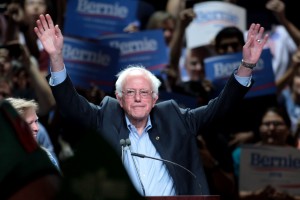Coming off a solid Super Tuesday, the Bernie Sanders campaign is not going down without a fight. Championing a platform premised on economic justice and corporate power, Sanders’s rhetoric resounds with that of Progressive reformers of a century ago. Yet, despite these similarities, he carries significant differences as well. Perhaps most notable is Sanders’s rhetorical positioning of himself as the leader of a “political revolution” rather than a reformer. However, what about his campaign is revolutionary? Can politics be revolutionary?
If we can think of revolution as a populist, non-institutionalized movement that seeks to bring fundamental change to the current political system from outside of the established political order, then can electoral politics be revolutionary? Can something that exists within the system bring about revolution? Or, to cast Audre Lorde’s famous words into a question, can the master’s tools bring down the master’s house? Can something that is inside also be outside?
Let’s begin by looking at Sanders’s positioning of himself as a political outsider. Many in the Clinton camp have questioned how Sanders can defend such a position. After all, Sanders has been a congressman for nearly thirty years in the State of Vermont, and before that he was the Mayor of Burlington. Rather than being opposed to the establishment, Sanders looks much like a part of the system he condemns.
However, refusing to take money from corporations, PACs, Super PACs, or vested political interests, Sanders’s campaign has been fueled by primarily small, individual donations to his campaign. This is one of the most impressive facts of the campaign and certainly unprecedented in an electoral system that is largely pay to play. By highlighting this aspect of his campaign, with its clear relation to his policy platform, Sanders justifies this label by portraying himself as outside of the political status quo.
This raises an interesting dynamic. In this light, both positions seem to be correct to some degree. While Sanders is the consummate career politician, he is also refusing to be bound by the structures of the current campaign finance system. Thus, Sanders is both insider and outsider, being at once within and exterior to the political establishment.
Let’s dig a bit further. On February 28th of this year U.S. Representative Tulsi Gabbard of Hawaii, the now former vice chair of the Democratic National Convention, resigned her position in order to endorse Sanders. When interviewed about her decision Gabbard claimed that she was warned by DNC officials not to break from Clinton in support of Sanders. Resigning her position and feeling pressure to back Clinton raises interesting questions regarding Sanders’s outsider status, and his claims of a political revolution. Not only is Sanders outside of the current campaign finance system, he also appears to exist outside of the DNC official position. While Sanders has long been allowed to exist as an independent voice in the senate, there is now hesitancy on the part of the Party to allow Sanders’s particular brand of democratic socialism (a topic worthy of its own essay) to the be their official platform. His views clearly seem to differ from a majority of those in the Party. This is Sanders’s establishment.
Coming to the larger question of revolution we now need to understand the attempts to rhetorically align politics proper with revolutionary aspirations. Many in the media have questioned the viability of Sanders’s “revolution,” pointing to its colorblind policies, overwhelmingly white voter base, and sexist supporters (certainly all interrelated problems) as inherent limitations to his vision of socialist politics.
While there have been ardent critics of Sanders on his relative silence on matters of racial inequality, from Black Lives Matter protestors at the Net Roots conference, as well as in Seattle, and also after the alleged “English only” comments at a recent rally, others have found in his platform room for a more inclusive revolution. With individuals such as rapper Killer Mike, Cornel West, Michelle Alexander, Ta-Nehisi Coates (who has been quite critical of Sanders), and Erica Garner all endorsing Sanders, while continuing to push him on race, his history of activism for civil rights, coupled with Sanders’s condemnation of the Bernie Bros, seem to demonstrate attempts to craft a revolution across multiple axes of identity including race, gender, and class.
Through the debates regarding Sanders’s platform, I think we may begin to draw out an understanding of political revolution as occupying a paradoxical position that seeks to reshape established political institutions from both within and without. I believe that it is this liminal space that is the site of Sanders’s political revolution. By fundamentally altering the current structure of campaign finance and the DNC itself, as well as seeking to craft a coalitional movement across identity and difference, Sanders seeks to change politics from within while playing outside the bounds of the norms of political culture. Sanders seeks to be within their world but not of it.
However, this raises important questions for leftist politics. Is such a position truly viable? Does the usage of the label “revolution” do damage to more radical positions by appropriating the term? Or, to the contrary, does inoculating the public from some of its more radical connotations allow for a more nuanced discussion of non-traditional policy positions by broader publics? What are the limitations to Sanders’s positions on race? Additionally, how do we reconcile this label with Sanders’s platform? Espousing largely a nationalist agenda, how can we reconcile the label of revolutionary with his positions on foreign policy, specifically with regard to Palestine?
Certainly these are only some of the important questions raised by Sanders’s campaign and by the paradoxical idea of a political revolution more broadly. The answers to these questions are not simple. They may likely exist in the liminal space of a “political revolution” itself.



